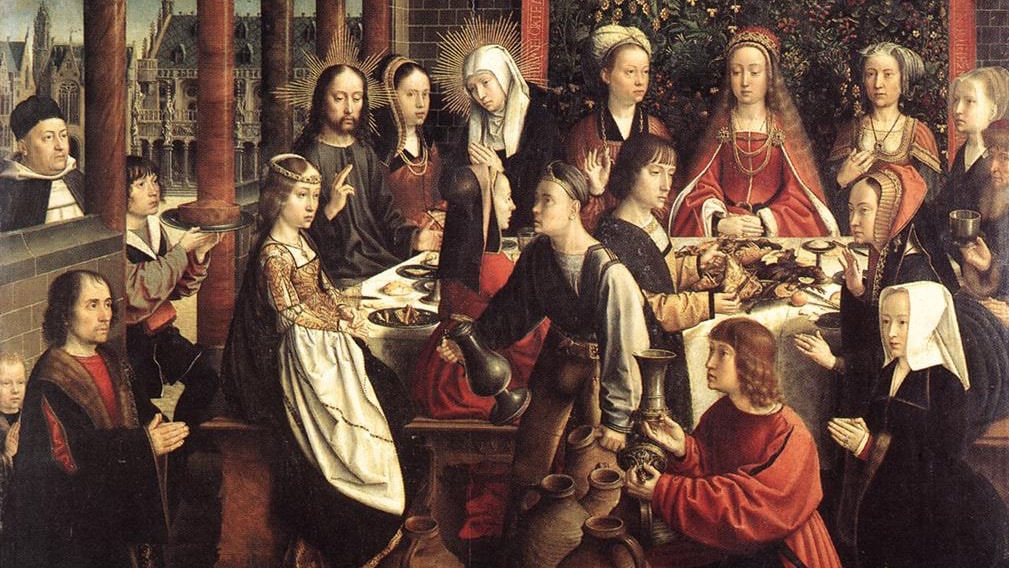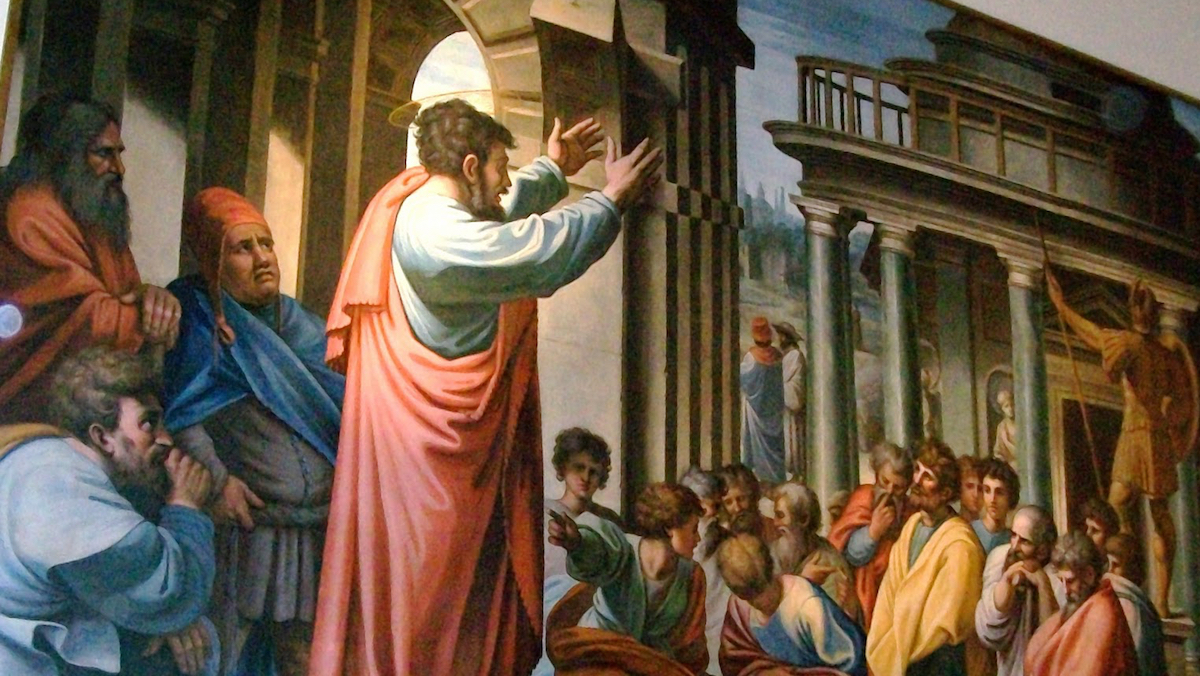To the mysterious aspects of life we ought to add the mysterious message hidden in the Gospel passage from John (2:1-11). We are quite familiar with it, but we do not really know how rich with meaning each line is.
The first thing that jumps right out is the fact that we have a wedding but no bride and the groom is mentioned only once. We have Jesus, we have, Jesus’ mother Mary, we have the disciples, we have the headwaiter, but no wedding couple to speak of…
All attention seems to be on Jesus, the Bridegroom of the new covenant revealing, upon request from the Blessed Mother (his and ours) the hour of his glory ahead of the time appointed by the Father. In other words, through the intercession of Mary, Jesus, the second Person of the Holy Trinity was talked into showing a preview to his Bride (the Church, represented by the first disciples and by Mary) of the Father’s ardent desire to draw everyone into His eternal, loving embrace.
God is a communion of love so intense that the love of the Father for His Son and of the Son for the Father is the third Person of the Holy Trinity, the Holy Spirit. Being love, God cannot contain all that love in Himself; but HAS, so to speak, to pour it upon us, the objects of His love. Therefore, we can look at the Incarnation, at the flesh of Christ Jesus, from this point of view: Jesus, the Divine Bridegroom, HAS to show, in a visible way, that the Holy Trinity HAS to reach out to us, the Bride, the objects of their endless love. Not only that, but we can discover deep within our hearts, the ability built in them by our Creator God, to receive His love and to respond to it with love of our own.
May we dwell on this fact for a moment. May we rediscover our deep-seated, intense desire for intimacy, for a meaningful, unbreakable embrace, for becoming one with a significant other, for communion, for full expressions of love.
At this time, we should relive our best, most meaningful embrace, be it with our Mom or Dad, with our spouse, our fiancée, our children, our best friend. It becomes soon evident how God created us with the capacity for long, meaningful embraces and for communion. Could we see, then, also how disconnected, hurt, lost, angry, frightened, even vengeful any broken embrace could make us?
Obviously, on this earth, the most eloquent and meaningful embrace is the one between bridegroom and bride; between husband and wife joined in holy matrimony. However, perhaps, as I asked you to join me in reliving meaningful embraces; I might have reopened some deep, painful wounds. We are such that, in our human frailty and lack of clear vision, we might have reached out to embraces that are not possibly meaningful in the long run. And in those attempts we might have hurt ourselves and others; and made ourselves vulnerable to misplaced longing. Delving into this incident in the life of Christ, we could associate our mere human attempts at meaningful embraces with the water in those jars meant for legal purification. By themselves, our mere human efforts and intentions hold no wine; deliver no joy; initiate no celebration. Hence, we could feel truly desolate and forsaken.
Actually, chances are that we might feel desolate and forsaken not only for a few days but repeatedly, and for prolonged, seemingly endless periods of time because although “hardwired” by our Creator for genuine loving embraces, we might have, instead, reached out repeatedly for inordinate relationships.
The good news that we are urged to live out and to enjoy fully is this: Christ Jesus, our Divine Bridegroom has seen all our desolation and our loneliness and has come to tell us that we do not have to wait to be touched by his love on the Cross. Now, and any time we need to feel God’s embrace, through Mary the Mother of both Bride and Groom, we can have our miserable, poor water changed into choice wine, the wine of genuine joy in the Lord our God.
Obviously, the deeper our wound from less-than-meaningful embraces, the more evident we need the signs of God’s love for us to be. The more we feel desolate and forsaken, the more we must find the way to become God’s delight and be able to rest in His embrace even now, on this earth. It seems safe to say that the most reassuring way to feel God’s embrace on this earth is through Holy Communion.
Even after we have gone home from church we can still relive those wonderful moments of intimacy with him. Another rewarding way is by meeting Jesus in the Holy Scripture. This is done by “resting” in God’s Word and by training our soul to recognize the voice of the Divine Bridegroom.
Another vicarious way is through those physical embraces that are blessed by God such as between husband and wife, between parent and child, between true friends, between people engaged to be married and between believers assembled for the Eucharist. Actually, in 1 Thessalonians 5:26, St. Paul urges believers to greet each other with a holy kiss.
If you have discovered other ways of feeling God’s closeness and embrace, go ahead, enjoy them. I can think, for example, of doing so through Eucharistic Adoration before the Blessed Sacrament, through our tender devotion to the Blessed Mother Mary and/or to our favorite saint.
The desired result is not only to long for God’s ultimate embrace in heaven or to feel His presence now on earth, but also to live every day of our life in the light of our faith in Jesus Christ.
…and his disciples began to believe in him.
Our faith in Jesus Christ must be nourished daily by little divine embraces until the thoughts that we entertain, the choices that we make, the words that we utter, the responses that we give and the actions that we take are, precisely and exclusively, prompted by our love for him, a love constantly enlightened by the Holy Spirit; the same Spirit that will seal us one day into the Father’s eternal embrace.








